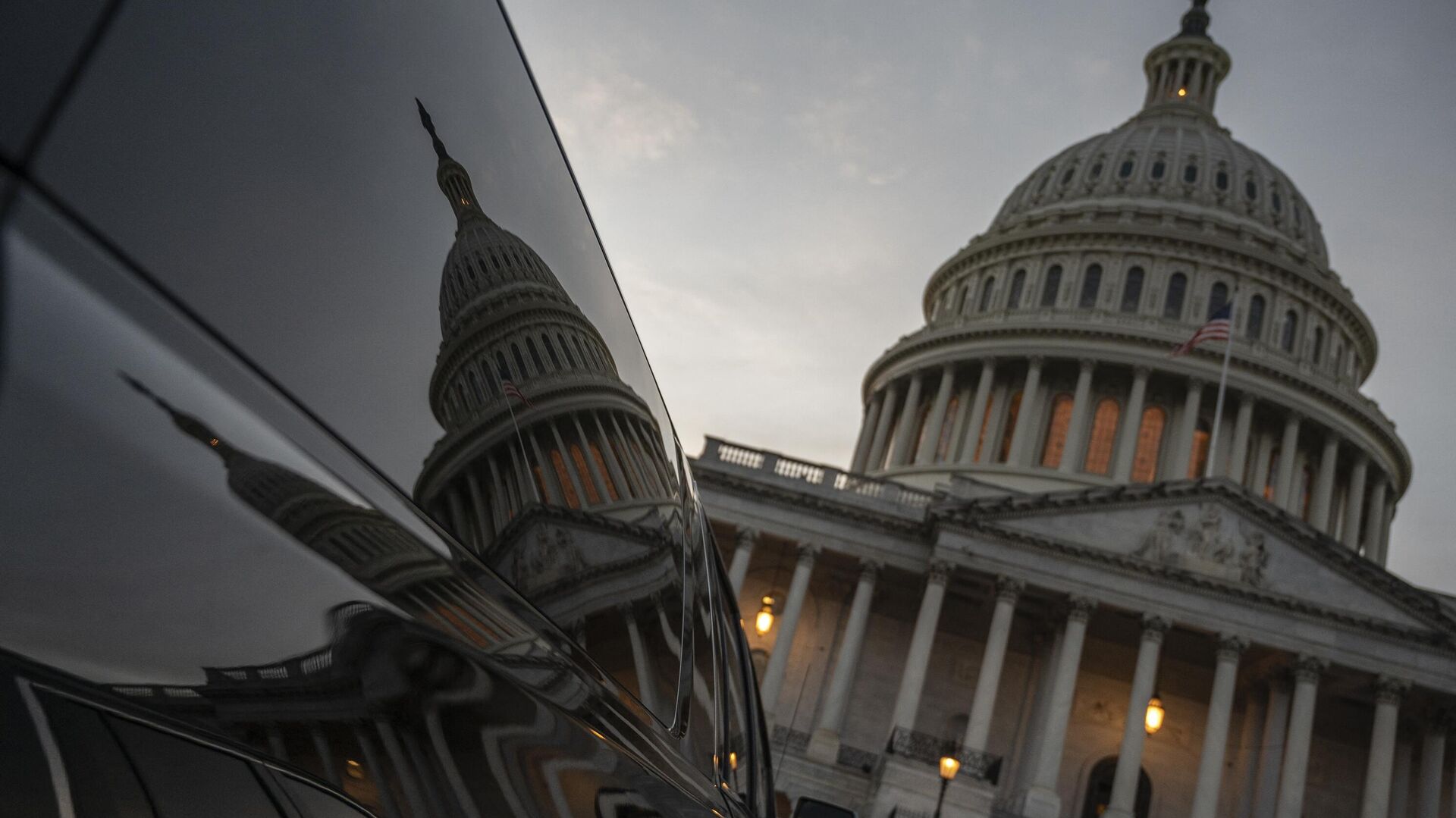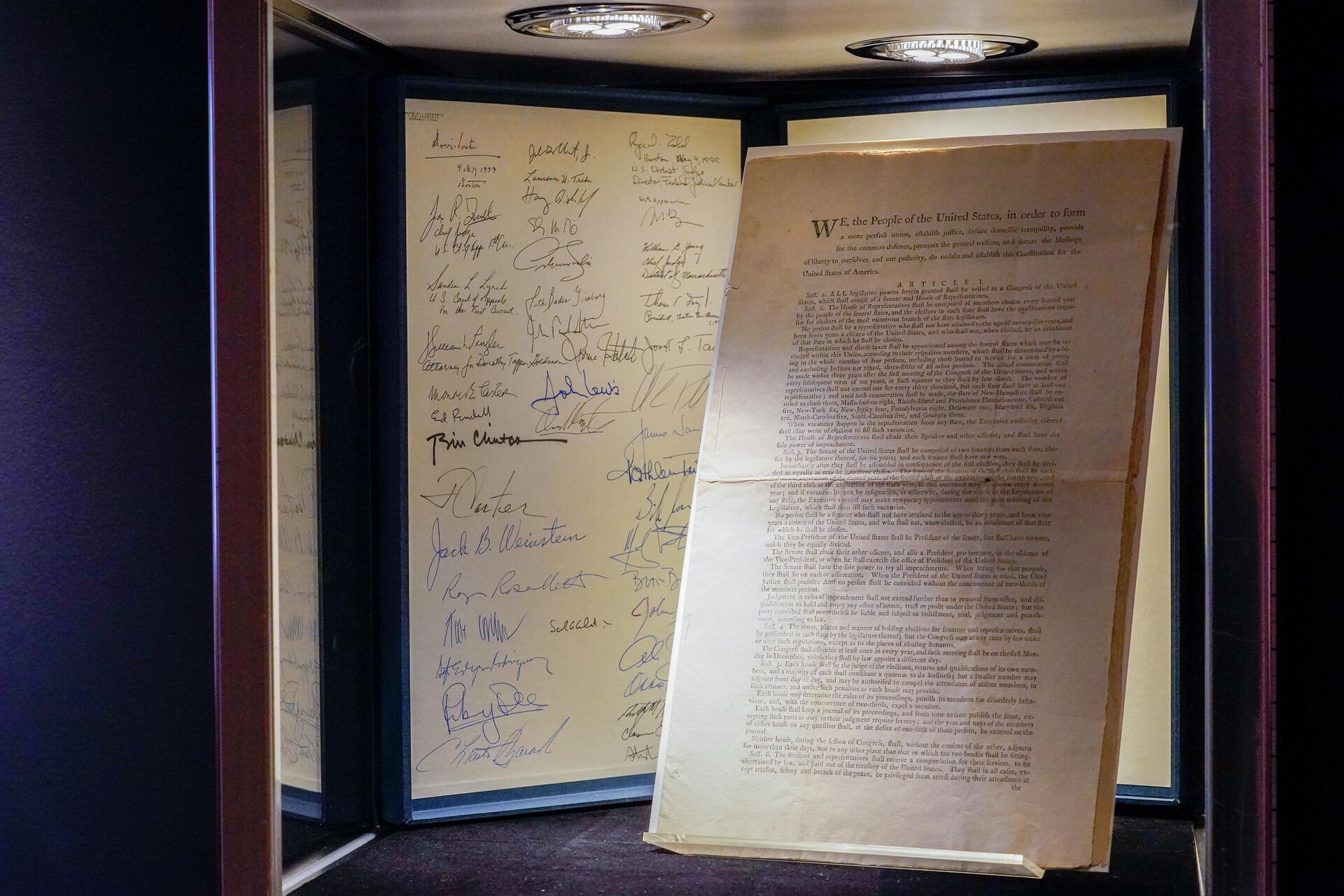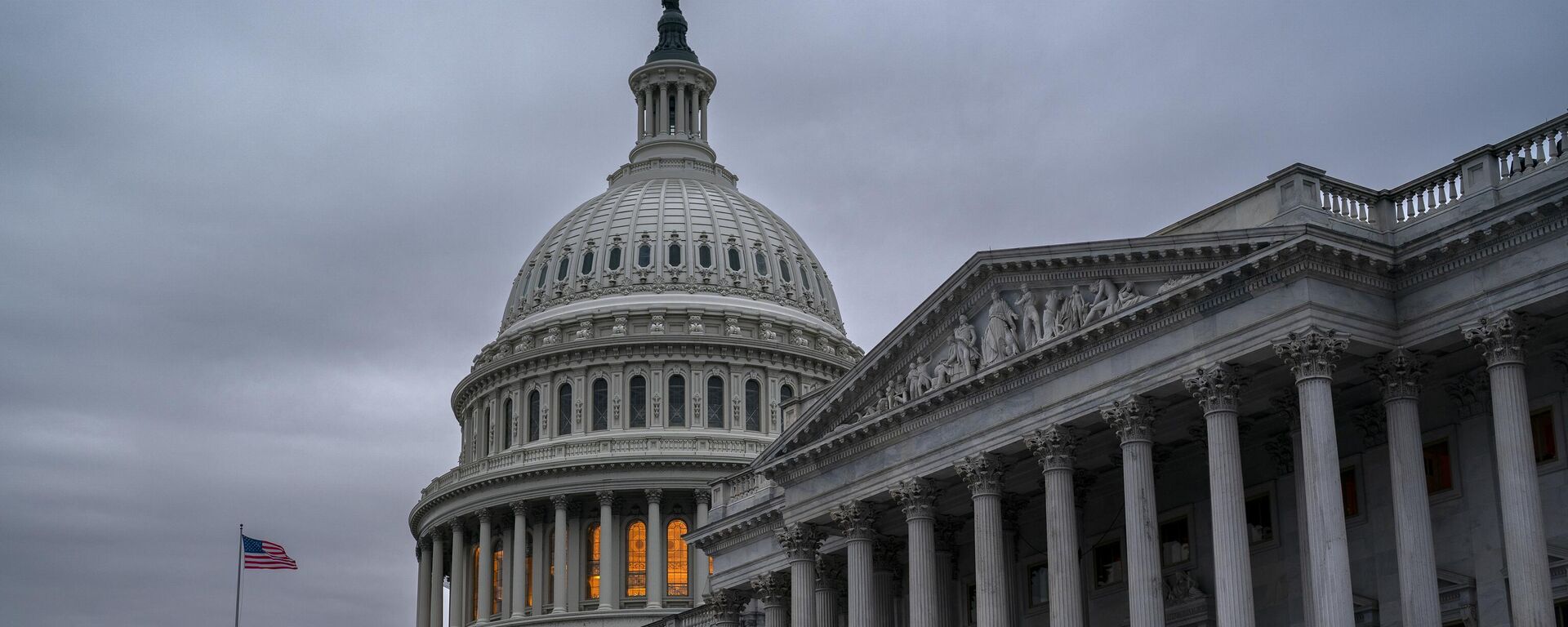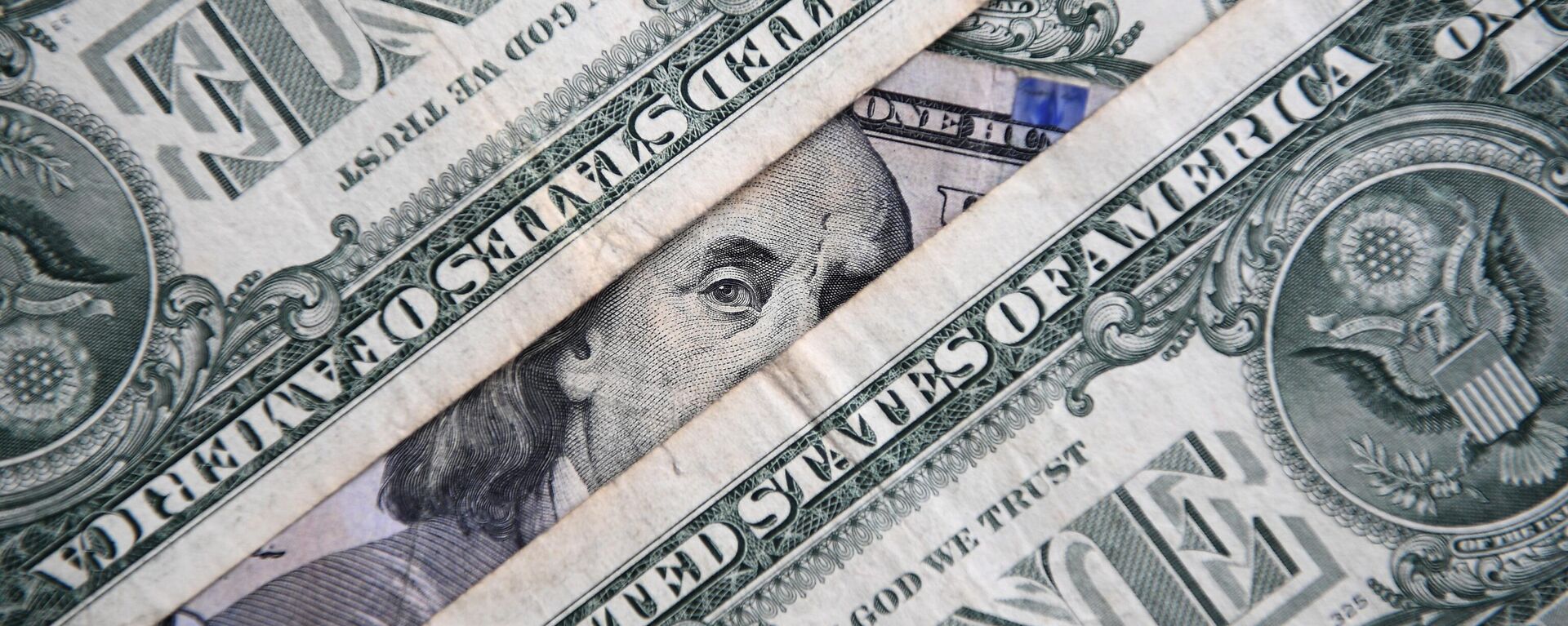https://sputnikglobe.com/20230506/what-is-14th-amendment-biden-not-ready-to-invoke--how-is-it-tied-to-us-debt-ceiling-crisis-1110141414.html
What is 14th Amendment Biden Not Ready to Invoke & How is It Tied to US Debt Ceiling Crisis
What is 14th Amendment Biden Not Ready to Invoke & How is It Tied to US Debt Ceiling Crisis
Sputnik International
What is 14th Amendment, and why d Debt Ceiling Crisis?
2023-05-06T12:58+0000
2023-05-06T12:58+0000
2023-05-06T12:58+0000
americas
us
kevin mccarthy
us debt ceiling crisis
debt ceiling
us constitution
default
https://cdn1.img.sputnikglobe.com/img/07e6/0c/0e/1105438904_0:187:2981:1863_1920x0_80_0_0_c5858814484b0c86d39712fb120b7cdb.jpg
Amid the ongoing US debt ceiling crisis and fears of a looming default, US President Joe Biden quipped that he had “not gotten there yet” when asked in a recent media interview if invoking the 14th Amendment was on the table.The Democratic POTUS is on schedule for a sit-down with congressional leaders, including House Speaker Kevin McCarthy (R-Calif.) and Senate Minority Leader Mitch McConnell (R-Ky.) on May 9 at the White House to try to break the impasse on the debt ceiling.What is the 14th Amendment and how is this constitutional clause linked to the US debt ceiling row? Sputnik explains.What is the 14th Amendment?The 14th Amendment is a legal tool guaranteeing citizenship and equality rights. It contains five sections. One of them - Section 4 - is the one linked to the debt ceiling issue.Adopted by the US Senate on June 8, 1866, the 14th Amendment to the Constitution of the United States was ratified two years later. It was one of three amendments passed after the Civil War (1861 – 1865). Conferring citizenship to former slaves was its principal purpose. As slavery was abolished and civil and legal rights set in place for black Americans, the amendment in question endowed with citizenship all persons "born or naturalized in the United States," offering them “equal protection under the laws."How is the 14th Amendment Linked to the US Debt Ceiling?Payment of any debt owed to the defunct Confederate States of America after the end of the Civil war is what Section Four of the 14th Amendment to the US Constitution originally banned. Payment to former enslavers as compensation for the loss of human "property" was also prohibited.But what makes this section relevant in the ongoing debate over the debt ceiling is the following words contained in it:This public debt clause, in the opinion of some legal scholars, overrides the statutory borrowing limit, currently set by Congress at $31.4 trillion. Has the 14th Amendment Ever Been Used in a Debt Ceiling Row?No, if Joe Biden were to cite the 14th Amendment and state that the concept of the debt limit is unconstitutional, thereby ignoring it, this would happen for the first time in the history of the United States.What is the Debt Ceiling?The debt ceiling is the maximum amount of money that the United States government is authorized to borrow to meet its existing legal obligations, such as Social Security and Medicare benefits, military salaries, interest on the national debt, tax refunds, and other payments. It was set in place by a law dating back to 1917. When the US federal government spends more and more, far above the amount of revenue it takes in, it resorts to borrowing money. As breaching the debt limit may result in a default for the government, whenever the US has approached the limit, Congress has voted to raise or suspend the debt ceiling.What Have US Presidents Said About Using the 14th Amendment?As some legal pundits speculate whether President Joe Biden could solve the impasse over the debt ceiling by simply "ordering" the government to continue borrowing money by citing the 14th Amendment to the Constitution, there have been varying stances on the issue in the past. For example, ex-POTUS Bill Clinton once said that if faced with the challenge of a looming default, he would raise the debt ceiling using the 14th Amendment "without hesitation, and force the courts to stop me."When Barack Obama, another ex-president, was asked if he would use the 14th Amendment in this connection, he was quoted as saying:What Would Happen If the 14th Amendment Were Invoked?While a default would be dodged and government payments maintained, experts warn that the fallout from a president invoking the 14th Amendment would impact the economy seriously, with borrowing costs most likely soaring, while a legal challenge could also be anticipated.However, scholars cited in media reports claim it would be challenging to do so. A plaintiff would need to prove they had been harmed by the action of invoking the amendment.Meanwhile, as various scenarios are jostled by scholars, Secretary of the Treasury Janet Yellen has warned that the US is set to exhaust the extraordinary measures in place to avert default as soon as by June 1.With the House GOP demanding linking raising the ceiling to spending cuts, and the Democratic president seeking to rule out any such preconditions, the tussle is set to continue.
https://sputnikglobe.com/20230505/debt-ceiling-turmoil-white-house-claims-china--russia-would-capitalize-on-us-default--1110110554.html
https://sputnikglobe.com/20230504/debt-ceiling-battle-and-federal-reserve-interest-hikes-could-wreck-us-economy-1110096898.html
https://sputnikglobe.com/20230503/us-economy-in-peril-as-yellen-warns-debt-ceiling-inaction-1110039270.html
americas
Sputnik International
feedback@sputniknews.com
+74956456601
MIA „Rossiya Segodnya“
2023
News
en_EN
Sputnik International
feedback@sputniknews.com
+74956456601
MIA „Rossiya Segodnya“
Sputnik International
feedback@sputniknews.com
+74956456601
MIA „Rossiya Segodnya“
14th amendment, us constitution, debt ceiling, us debt ceiling crisis, default, default on debt obligations, looming default,
14th amendment, us constitution, debt ceiling, us debt ceiling crisis, default, default on debt obligations, looming default,
What is 14th Amendment Biden Not Ready to Invoke & How is It Tied to US Debt Ceiling Crisis
The debt ceiling battle between House Democrats and Republicans has been playing out against the backdrop of dire warnings that a potential US default could trigger a domino destabilizing effect on the entire global economy.
Amid the ongoing
US debt ceiling crisis and fears of a looming default, US President Joe Biden quipped that he had “
not gotten there yet” when asked in a recent media interview if invoking the
14th Amendment was on the table.
The Democratic POTUS is on schedule for a sit-down with congressional leaders, including House Speaker Kevin McCarthy (R-Calif.) and Senate Minority Leader Mitch McConnell (R-Ky.) on May 9 at the White House to try to break the impasse on the debt ceiling.
What is the 14th Amendment and how is this constitutional clause linked to the US debt ceiling row? Sputnik explains.
What is the 14th Amendment?
The 14th Amendment is a legal tool guaranteeing citizenship and equality rights. It contains five sections. One of them - Section 4 - is the one linked to the debt ceiling issue.
Adopted by the US Senate on June 8, 1866, the 14th Amendment to the Constitution of the United States was ratified two years later. It was one of three amendments passed after the Civil War (1861 – 1865). Conferring citizenship to former slaves was its principal purpose. As slavery was abolished and civil and legal rights set in place for black Americans, the amendment in question endowed with citizenship all persons "born or naturalized in the United States," offering them “equal protection under the laws."
How is the 14th Amendment Linked to the US Debt Ceiling?
Payment of any debt owed to the defunct Confederate States of America after the end of the Civil war is what Section Four of the 14th Amendment to the US Constitution originally banned. Payment to former enslavers as compensation for the loss of human "property" was also prohibited.
But what makes this section relevant in the ongoing debate over the debt ceiling is the following words contained in it:
"The validity of the public debt of the United States, authorized by law, including debts incurred for payment of pensions and bounties for services in suppressing insurrection or rebellion, shall not be questioned.”
This public debt clause, in the opinion of some legal scholars, overrides the statutory borrowing limit, currently set by Congress at $31.4 trillion.
Has the 14th Amendment Ever Been Used in a Debt Ceiling Row?
No, if Joe Biden were to cite the 14th Amendment and state that the concept of the debt limit is unconstitutional, thereby ignoring it, this would happen for the first time in the history of the United States.
What is the Debt Ceiling?
The
debt ceiling is the
maximum amount of money that the United States government is authorized to borrow to meet its existing legal obligations, such as Social Security and Medicare benefits, military salaries, interest on the national debt, tax refunds, and other payments. It was set in place by a law dating back to 1917. When the US federal government spends more and more, far above the amount of revenue it takes in, it resorts to
borrowing money.
As breaching the debt limit may result in a default for the government, whenever the US has approached the limit, Congress has voted to raise or suspend the debt ceiling.
What Have US Presidents Said About Using the 14th Amendment?
As some legal pundits speculate whether President Joe Biden could solve the impasse over the debt ceiling by simply "ordering" the government to continue borrowing money by citing the
14th Amendment to the Constitution, there have been varying stances on the issue in the past. For example, ex-POTUS Bill Clinton once said that if faced with the challenge of a looming default, he would raise the debt ceiling using the 14th Amendment "without hesitation, and force the courts to stop me."
When Barack Obama, another ex-president, was asked if he would use the 14th Amendment in this connection, he was quoted as saying:
"I don't think we should even get to the constitutional issue. Congress has a responsibility to make sure we pay our bills. We've always paid them in the past."
What Would Happen If the 14th Amendment Were Invoked?
While a default would be dodged and government payments maintained, experts warn that the fallout from a president invoking the 14th Amendment would impact the economy seriously, with borrowing costs most likely soaring, while a legal challenge could also be anticipated.
However, scholars cited in media reports claim it would be challenging to do so. A plaintiff would need to prove they had been harmed by the action of invoking the amendment.
Meanwhile, as various scenarios are jostled by scholars, Secretary of the Treasury Janet Yellen has warned that the US is set to exhaust the extraordinary measures in place to avert default as soon as by June 1.
With the House GOP demanding
linking raising the ceiling to spending cuts, and the Democratic president seeking to rule out any such preconditions, the tussle is set to continue.





